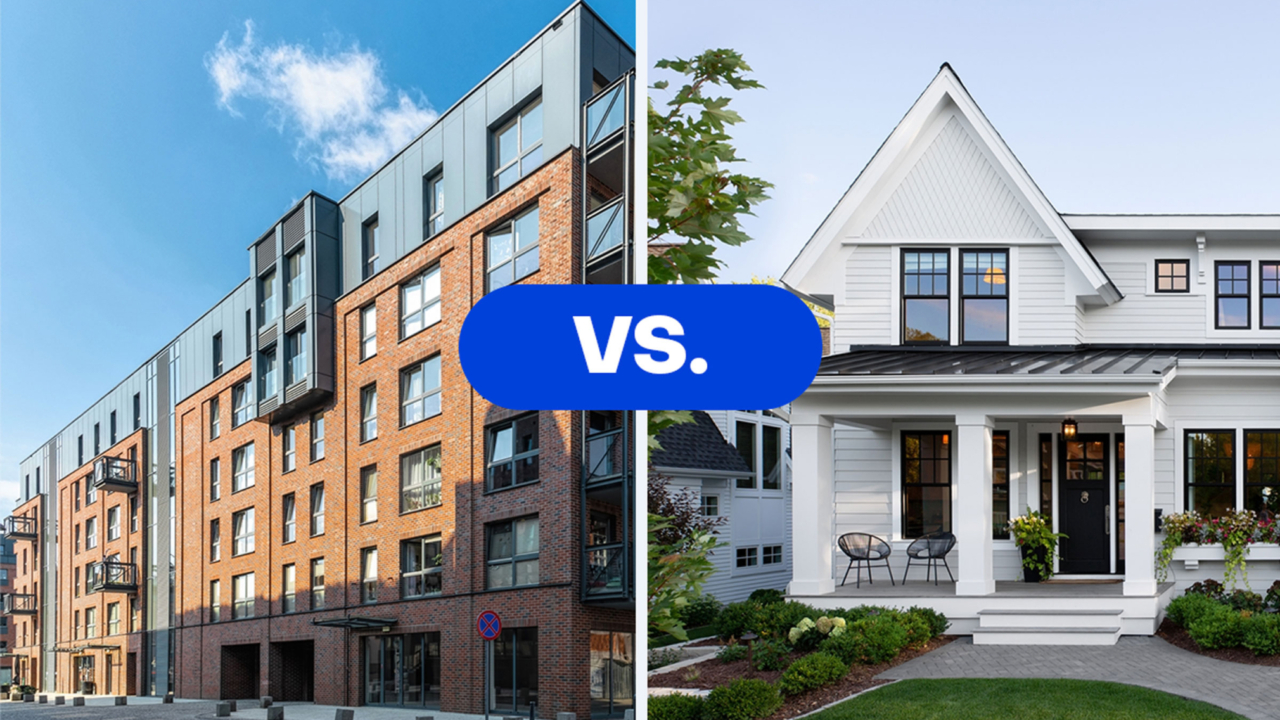25 Home-Buying Myths to Unlearn Right Now
Your future homeowner self will thank you for it.


Written by May Ortega on October 22, 2025
If you're reading this, you've likely received a flood of well-intentioned home-buying advice from all corners of your life. From your aunt who’s a seasoned pro with five houses under her belt, to that random stranger on social media who swears by their tips, everyone seems to have their opinion. But how do you sift through the sea of suggestions to find the valuable guidance versus the ones that are outdated or simply incorrect?
To help you make informed decisions, we've compiled 25 myths to know as you shop for a home — along with truths to set you on the right path.
Myth #1: You need a 20% down payment
Fact: A 20% down payment hasn't been required to buy a home for decades, if ever.
Many home loans allow a down payment as low as 3%, as long as you’re borrowing less than the so-called “conforming” loan limit for the county where the home you want to buy is located. (The limit for most counties is $832,750, as of 2026.)
Although down payments of less than 20% are common, keep in mind you will need to pay PMI (private mortgage insurance) on a conventional loan if you put down less than 20% of the home’s purchase price. To see an estimated calculation of your PMI based on your loan and down payment amounts, try the Zillow Mortgage Calculator.
Myth #2: A bigger down payment is always better
Fact: While a larger down payment can reduce your monthly mortgage payment and potentially help you avoid private mortgage insurance (PMI), it is not always the best financial move. The ideal down payment depends on your personal situation and financial goals.
Putting down a larger sum of money can make your loan more attractive to a lender and lower your interest rate, but it can also deplete your savings. Homeownership comes with unexpected costs, from immediate repairs to furnishing your new space, so it's critical to have a healthy emergency fund after closing. The smartest strategy is to find a balance between a down payment you are comfortable with and maintaining enough cash reserves to handle the inevitable expenses that come with buying and owning a home.
Myth #3: You should wait to buy a home until prices are lower
Fact: Residential property prices in the U.S. have only fallen four times over the last 80 years, according to Zillow Senior Economist Orphe Divounguy. A lot of factors would have to align in order for you to see a significant drop.
“House prices depend on non-housing and financial wealth, labor market conditions, and mortgage rates,” Divounguy said.
Because widespread declines in home prices have been so rare, if you’ve been interested in a particular home and you see its cost go down, it's usually a great opportunity to “buy the dip,” as Divounguy puts it. But don’t expect all the homes in your area to see the same price change. If you do wait for that to happen, you could end up delaying your home-buying journey to save very little money, if any at all. If you find a home that feels like “the one,” talk to a lender or an agent — it may not be on the market for long.
Myth #4: You shouldn't buy until you can afford your forever home
Fact: If you wait to buy until you can afford your forever home rather than buy a lower-cost starter home, you may never buy at all.
Or in the relatively more affordable markets where appreciation is still happening, you may miss out on years of equity building that could offset your selling costs when you trade up to your forever home.
Though there is a caveat: If you’re considering buying a home you already know that you'll outgrow in the near future, it might make sense to wait until you find a home where you can stay for at least five or more years.
Find homes in your budget with BuyAbility℠
Myth #5: Buying a home is always cheaper and a better investment than renting
Fact: Depending on where you live, renting a home can be cheaper than buying one, and home prices don't always go up and up in a neat, straight line.
Rents and mortgage payments are much closer than they have been in the past, and, in a majority of the nation’s top 50 metros, rents are cheaper than mortgages — even for a comparable home.
However, a home you own is an asset that can appreciate over time, provide a relatively stable monthly cost and create generational wealth.
There are benefits to each option. How the math works out for any individual depends in part on what you expect from the market, how long you expect to live in the home and what kind of lifestyle you’re looking for. You can use Zillow’s Rent vs. Buy Calculator to determine which is the best option for you.
Myth #6: You should find a home before you apply for a home loan
Fact: It is perfectly acceptable to get a head start on your mortgage loan application, and it can even be a smart strategy.
The initial loan application process typically starts with a pre-approval, which tells you the maximum amount you can borrow (i.e. the most money the bank will lend you to pay for a home). This lets you shop for homes with a clear price limit in mind, preventing you from getting attached to a home you can't afford. It also shows home sellers that you've already been vetted by a lender, making your offer stronger than one from a buyer who has not yet started the process.
Myth #7: You have to get your loan from the lender who pre-approves you
Fact: A pre-approval is a great starting point for getting a mortgage, but you're not obligated to stay with that lender if they don’t seem like a good fit for you.
Keep in mind that it’s best practice to shop for a lender before you go under contract or lock in a rate. Once you are under contract and have completed inspections and appraisals, it’s usually not a good idea to shop around for a new lender. If you do, you will need to notify the seller's agent of the change. Any delays or changes could put you at a higher risk of getting your offer rejected by the seller.
Myth #8: Your pre-approval rate is the rate you'll get when you close
Fact: Interest rates adjust daily. The rate you're quoted when a lender pre-approves you for a mortgage is based on current market conditions as well as factors like your loan amount, credit score, property type and where the home is located. In general, your actual rate can't be "locked in" until you find a home and sign a purchase contract with the seller.
“At that time, your loan officer can explain your options and help you choose a rate," says Wesley Black*, manager for mortgage originations at Zillow Home Loans in Irvine, California.
Your locked-in rate may be higher or lower than your pre-approval rate. But be aware that locked-in rates can expire, so you should ask how long yours will last.
Myth #9: A 30-year, fixed-rate mortgage is always the best choice
Fact: Depending on rate movements, adjustable-rate mortgages (ARMs) can save thousands of dollars of interest over the life of the loan compared with a fixed-rate. ARMs have an initial fixed-rate period, and then can adjust up or down, resulting in monthly payments that can change over time. ARMs aren't a fit for everyone, but for many, they are worth considering.
Myth #10: You need excellent credit to buy a home
Fact: Good home loans and attractive rates are available for people with less-than-perfect credit as well as those with excellent credit. This is likely to come as news to a lot of borrowers since half of the loan officers surveyed cited it as the third highest misconceptions among prospective buyers.
Who can't qualify? People who develop a habit of always paying cash for their purchases. “Establishing positive tradelines and using credit responsibly is what we're looking for,' says Casey Godwin*, a mortgage loan officer for Zillow Home Loans in Overland Park, Kansas. If your credit is not where you'd like it to be, you can work on improving your credit before applying for a loan.
Myth #11: You can't buy a home if you have student loans
Fact: Student loans can both help and hurt your chances of buying a home.
The potential help comes from boosting your credit scores, if you make your payments on time. The potential hurt comes from raising your debt-to-income ratio, or DTI, which is a factor in loan approval. Student loans are not an automatic barrier. They're just another form of debt that's part of your DTI calculation. Many people have student loans and a home mortgage, but whether it’s possible to buy a house with student loans is determined on a case-by-case basis.
Myth #12: You cannot buy a home if you are self-employed
Fact: You absolutely can buy a home if you’re a self-employed freelancer or gig worker or business owner. But the rules for getting a mortgage are different for those who receive a W-2 from an employer versus those who receive a 1099-NEC, which reports non-employee compensation.
Lenders will generally require more documentation of income if you’re self-employed, including recent invoices and proof of a steady income over a longer period of time.
Myth #13: Fall and winter are bad times to buy a home
Fact: It can actually be advantageous to buy in the fall and winter, if you’re open to shopping with fewer fresh options.
Spring is typically called the “home-buying season” because many families prefer to move when their children are out of school for the summer. That doesn't mean you have to buy in the spring or that you'll pay less if you do. In fact, fall can be a "sweet spot" for buyers, with more homes available for sale and less competition from other buyers. This can give you more time to shop and can lead to more negotiating power with sellers.
Myth #14: Buying a fixer-upper will save you money
Fact: True fixer-upper homes need a lot more than a fresh coat of paint. These homes may have major structural problems, some of which may not be visible. Even a skilled home inspector can't see inside walls. So if you’re interested in buying a fixer-upper, make sure you do your research.
“If you're looking into a fixer-upper, you should get quotes on the repairs needed beforehand,” says Korenn Meno*, a mortgage loan officer at Zillow Home Loans in Seattle, Washington. “You'll have to be patient, good with finances and willing to sacrifice all your spare time to work on your home or pay someone to get your home fixed up."
You may end up with a home you love, but don't count on saving money with this strategy. (Take our quiz to see if tackling that fixer-upper is really right for you!)
Myth #15: If a house sits on the market for a long time, there's something wrong with it
Fact: While a home that’s been on the market for an extended period could have an issue, a long "days on market" count is often a sign of other factors, like the listing being overpriced for its location, condition, or size.
A home’s appeal and saleability are highly influenced by market conditions. In a sellers market, homes often sell quickly. Conversely, in a buyers market, where there are more homes for sale than buyers, it’s common for properties to sit for longer. Additionally, a home might be priced too high from the start, deterring potential buyers. Other reasons a house may not sell quickly include being poorly marketed with low-quality photos, a difficult-to-schedule showing process, or a challenging location.
Myth #16: All lenders are the same when buying a home
Fact: Getting a mortgage is more than an exercise in rate shopping, and there are significant differences among lenders when it comes to the customer service, the ability to close on time and the fees attached to their loans.
While getting the best interest rate is rightfully a top concern for home buyers, most lenders offer a variety of competitive rates and loan products. However, fees can vary widely and some lenders have a better track record for closing on time, communicating regularly though buyers’ preferred methods, including text and email, and making things easier on borrowers with technology to keep the process moving smoothly through closing.
For instance, with Zillow Home Loans, buyers and their agents can check on the status of their loan online, increasing visibility into the process and reducing the stress that can be generated when you’re in the dark about what’s going on.
Myth #17: Talk to lenders only when you’re ready to make an offer
Fact: You should consider connecting with a lender and get pre-approved for a mortgage before you begin seriously shopping for a home. This is a critical first step that gives you a clear understanding of your budget and strengthens your position as a buyer.
Getting pre-approved for a loan allows you to shop for homes within your actual price range, preventing you from falling in love with a house you can't afford. In today's competitive housing market, a pre-approval letter is also a powerful tool. It signals to sellers that you are a serious, qualified buyer whose financing has already been vetted, which can make your offer stand out from the competition. By getting this step out of the way early, you can also address any potential issues with your credit or finances, making the process of writing an offer and moving toward closing much smoother.
Myth #18: Equity only grows when you pay down your loan
Fact: Your home equity can grow in two ways: through the money you put toward your mortgage principal with each monthly payment, and through the appreciation of your home's market value.
Equity is the difference between what your home is worth and what you owe on your mortgage. While paying down your loan is a direct and guaranteed way to build equity over time, it's not the only factor. A home's value can appreciate due to market demand, inflation, or improvements you make to the property. This increase in value directly adds to your equity, often at a faster rate than what you're paying toward the loan, especially during the early years of a mortgage when most of your payment goes toward interest. Understanding both of these factors is key to realizing the financial benefits of homeownership.
Myth #19: You have to pay the seller's asking price to buy a home
Fact: The seller's asking price is the amount the seller hopes you'll pay, but it's not necessarily the price you'll actually pay.
This may seem obvious, but home prices are typically negotiated with offers and counter-offers until you and the seller agree on a price. Be sure to ask your agent for “comps” for a home you’re interested in — this is a report of prices of recently sold, similar homes nearby — in order to draft a competitive offer or understand whether the listing price fits in your budget.
Myth #20: Sellers always cover closing costs
Fact: Both buyers and sellers have closing costs, but they usually pay for different things. While a buyer can ask for a seller's credit toward their closing costs, it is not a given, and it’s a point of negotiation.
Closing costs, which can include various fees for loan origination, appraisals, and title insurance, are a significant expense for a buyer. In a buyer's market, where there are more homes for sale than buyers, sellers may be more willing to offer concessions, such as a credit toward closing costs, to make their home more appealing. However, in a competitive seller's market, where homes receive multiple offers, sellers are far less likely to agree to this. In fact, a buyer who is willing to pay their own closing costs may have a more attractive and competitive offer than one who asks for a seller's credit. Your real estate agent can help you determine if asking for a seller's contribution is a good strategy for the current market.
Myth #21: You always need to pay full cash to “win” in a hot market
Fact: While an all-cash offer is highly attractive to a seller, you can absolutely be competitive and win a bidding war with a well-structured offer that includes a mortgage.
Sellers love all-cash offers because they eliminate the financing contingency, reducing the risk of the deal falling through and often allowing for a faster closing. However, a skilled buyer’s agent can make their offer just as appealing. The key is to mitigate the seller's risk as much as possible.
To do this, get pre-approved for your loan, offering a competitive price, and being willing to waive or shorten contingencies, such as the appraisal or inspection. A substantial earnest money deposit can also signal your commitment, as can being flexible with the closing date to fit the seller's needs. Ultimately, a smart, well-structured financed offer has the potential to beat a cash offer, especially if the cash offer is for a lower price or has less favorable terms for the seller.
Myth #22: Refinancing is impossible or always expensive
Fact: While refinancing a mortgage does involve costs, it is a common and often beneficial process that can help you save money, change your loan terms, or achieve other financial goals.
Refinancing is essentially replacing your current mortgage with a new one. Yes, there are closing costs associated with refinancing, similar to when you first bought the home. These fees, which can range from 2% to 6% of the loan amount, cover services like the appraisal, title search, and loan origination. However, these costs can often be rolled into the new loan, so you don't have to pay them out of pocket. It's important to calculate your "breakeven point" — the time it will take for your monthly savings to recoup the cost of the refinance — to ensure the financial move is right for you.
Myth #23: Skipping an inspection saves money
Fact: While skipping a home inspection might save you a few hundred dollars at closing, it could cost you thousands in unexpected repairs down the line.
A home inspection is an investment in your financial safety and peace of mind. The fee you pay an inspector to thoroughly examine a home's structural and mechanical systems could save you the potential cost of major issues like a leaky roof, foundation problems, or a broken HVAC system.
While some buyers in a highly competitive market are tempted to waive the inspection to make their offer more appealing, it is a high-risk gamble. A professional inspection gives you the opportunity to discover potential problems and either negotiate with the seller for a credit or repair, or walk away entirely. By forgoing the inspection, you are buying the home "as-is" and accepting all the risks that come with it.
Myth #24: New construction homes don’t need an inspection
Fact: Even if a home is brand-new, it is still crucial to have a professional home inspection. New construction is not immune to human error.
Building a home is a complex process with many different contractors and subcontractors involved, and mistakes can happen. An experienced home inspector can find common defects such as improper plumbing or electrical wiring. Discovering these issues before you close on the home is essential, as it allows you to negotiate with the builder to fix the problems, usually at their expense.
Myth #25: Buyers pay their agents out of pocket
Fact: Buyers paying their agents isn’t a given anymore. A 2024 National Association of Realtors settlement has changed how real estate commissions are determined and paid. While historically the seller commonly paid the commission for both agents, buyers and sellers are now being reminded that they can negotiate how their agent is compensated and that a buyer may pay their agent directly.
Under the new rules, buyers are required to enter into a written agreement with their agent before touring any homes. This buyer's agency agreement spells out exactly how the agent will be compensated for their services. A buyer’s agent can now be paid a percentage of the purchase price, a flat fee, or even an hourly rate. While the seller can still offer to pay a portion of the buyer's agent's commission, it’s not a requirement. A buyer can negotiate a lower price with the seller and pay their agent themselves.
* Wesley Black, NMLS# 1889226
*Korenn Meno, NMLS# 1876162
*Casey Godwin, NMLS# 1540246
A local agent can help you stay competitive on a budget.
They’ll help you get an edge without stretching your finances.
Talk with a local agent


